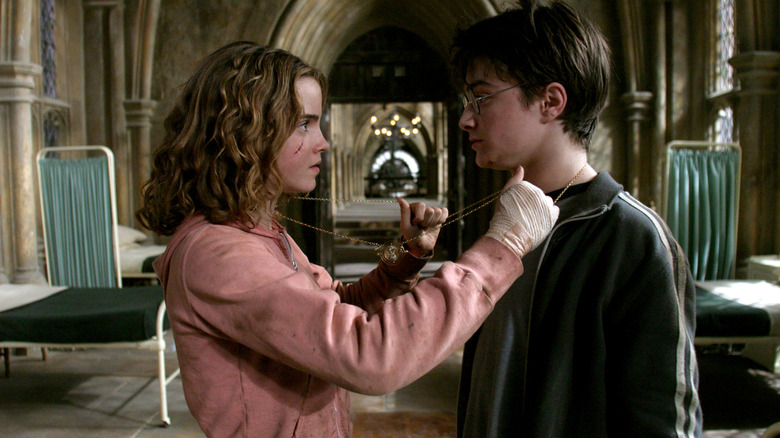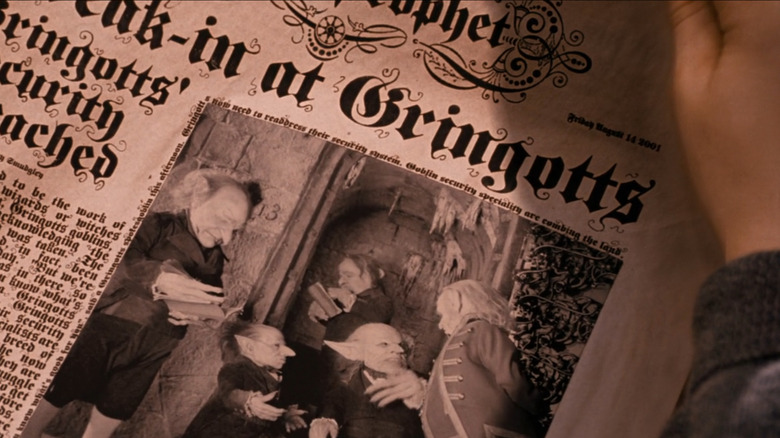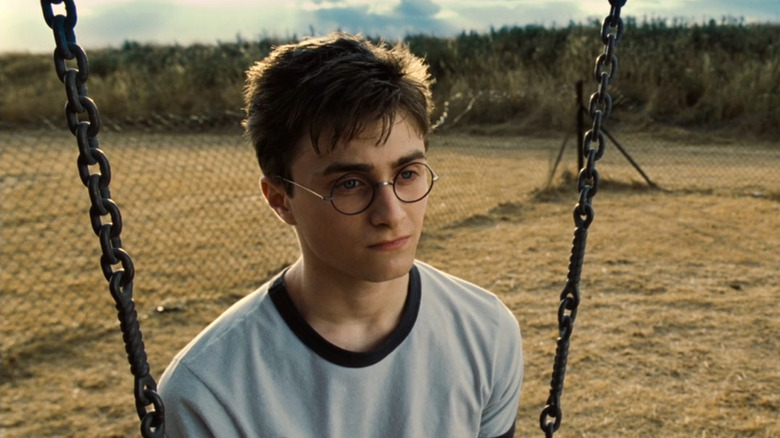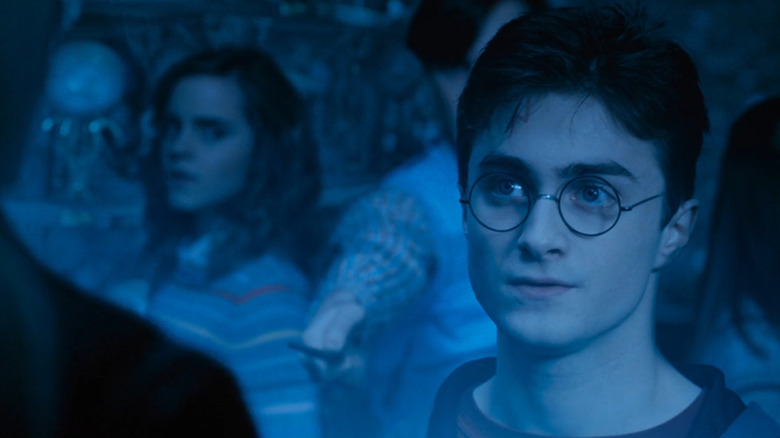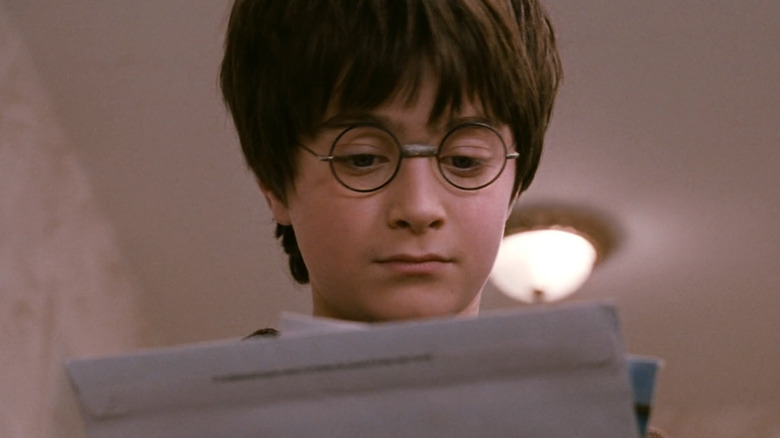The Harry Potter Movie Universe Timeline Explained
One bizarre yet understated aspect of the "Harry Potter" books is that they kind of count as period pieces. At first glance they might seem like they take place in the vague here and now, but on closer inspection it's clear that "Harry Potter and the Sorcerer's Stone," published in 1998, actually takes place from summer 1991 to late spring of 1992. The final book, published in 2007, takes place from 1997 to 1998. It's a shame Harry was so preoccupied with preventing Voldemort from taking over the world, because he could've been enjoying the golden age of "The Simpsons" instead. I suppose that's just one of many downsides to the Dark Lord's reign of terror.
The reason this '90s timeline is surprising to some of the more casual fans is that the book series doesn't have that strong of a '90s feel. Because Harry is off in a secluded wizarding world most of the time, he barely thinks about or interacts with anything going on with the muggle world outside. What did Harry think about the OJ Simpson trial, or Princess Diana's death? The books, perhaps wisely, deny us any such insights.
Still, the books do pay attention to the years. The presents Dudley gets for his birthday in the first book are very much toys a kid would want in the '90s. When Privet Drive is dealing with a heat wave at the start of "The Order of the Phoenix," this is based on an actual historic heat wave that happened that summer. The clearest indicator of what time these books take place in comes from "The Deathly Hallows." There, Harry visits his parents' graves, which mark their deaths as being in 1981.
So, if the books are set from 1991 to 1998, with that final epilogue jumping forward to 2017, what's the deal with the books? Were they also largely set in the '90s, or did the movies update them to the 2000s? Well, it's complicated...
The evidence that the 'Harry Potter' movies take place in the 2000s
Like the books, the "Harry Potter" films try their best to achieve a timeless feel, but every time they show us the muggle world they're forced to make countless choices that imply a specific time period. In the first movie, the Dursleys' car is a 1999 model; to a 2025 viewer the car could easily be mistaken for an early '90s car, but for viewers in 2001 it clearly implied that this movie was set in 1999 at the earliest.
Later in "Half-Blood Prince," Death Eaters are shown attacking muggles on the Millennium Bridge in London, a bridge that had not yet been built in the fall of 1996. In "Deathly Hallows: Part 1," where the main trio briefly find themselves hiding out in London, the clothing on the people around them (and the general look of the city) seem to indicate this is contemporary London, not the London of fall 1997. Nothing explicitly gives it away as 2011, but it certainly doesn't seem like the movie's trying to convince us otherwise.
Perhaps the most compelling piece in favor of the movies take place in the 2000s is a blink-and-you-miss-it moment in "Sorcerer's Stone." When Harry's reading an article about the Gringotts break-in, you can see (in the picture above) "Friday August 14 2001" marked on the upper right section of the newspaper. This seemingly solves the debate, right? Well, there's still some evidence in the other direction.
Evidence that the Harry Potter movies take place in the '90s
One clue fans point to is the beginning of "Harry Potter and the Order of the Phoenix," which, like the book, starts off with Britain going through a major heat wave like it did in 1995. Granted, I don't find this argument particularly compelling, as a heat wave could happen in any summer. The heat wave could've been a case of the movie capturing that same oppressive atmosphere of the book's opening without copying the book's exact date.
The real smoking gun comes in "Deathly Hallows: Part 1," where Harry and Hermione visit the gravestone of Harry's parents. As in the books, Harry's parents are shown here to have died in 1981. (Granted, you really have to squint to make out those numbers.) So, what gives? Is the problem that the multiple directors for the series led to conflicting ideas on the timeline? Is it simply a mistake by the production design team?
I think the most reasonable interpretation is that the "Harry Potter" movies exist on a floating timeline. Certain important events may be fixed to a certain time, but the characters stay in the vaguely-defined "now" to avoid anything feeling dated. This approach is most common with animated shows like "The Simpsons" or "Family Guy," which must find a way to reconcile their characters never aging with their desire to tackle topical issues.
However, similar tricks have been pulled in live-action shows. "Orange is the New Black," for instance, began in 2013 and had its main character spend 16 months in prison. But when she got out of prison in season 7, she was living in the world of 2019, the year the season released. It's a semi-valid creative approach, an example of TV magic viewers are expected to go along with. So, how could movie Harry have been born in 1980 but still be 17 in 2010? It only makes sense with a floating timeline. Don't think about it too hard.
The latter Harry Potter books are clear products of the 2000s
Making this all more complicated is that the "Harry Potter" books themselves aren't great at sticking closely to their established timeline either. In "Goblet of Fire" (which begins in summer 1994), we find out that Dudley owns a PlayStation, even though the PlayStation wasn't released in the UK until December of that same year. Boy, I sure hope someone got fired for that blunder.
Anachronisms aside, what complicates the "Harry Potter" timeline in a lot of fans' memories is that the final three books (published in '03, '05, and '07 respectively) have a very strong 2000s feel. These were the three "Potter" books written in a post-9/11 world, and they tapped in nicely to the new age of paranoia and government overreach. The rise of villain Dolores Umbridge in the fifth book both skewered conservative authoritarianism and destroyed any illusions Harry had that the government would ever have his best interests at heart.
Sure, it's likely that a lot of these plot points were planned out back in the '90s, that they aren't completely the result of the world's political environment in the 2000s, but that doesn't change the books' impact. "Harry Potter" went from a charming kids series in the first four books to an angry, rebellious text in the early 2000s, capturing that anti-establishment anger that "The Hunger Games" would soon embrace to even greater success. The final three "Harry Potter" books may literally take place in the mid-'90s, but spiritually they take place in the mid-'00s.
When will the upcoming Harry Potter TV show take place?
With every update on the upcoming HBO Max TV show rebooting the "Harry Potter" franchise, a common critique is: what's the point? The movies already did a perfectly respectable job at adapting the books, so what can this TV show do differently that'll let it feel fresh? There are a lot of potential answers to that question, but one small solution to avoiding that repetitive feeling is to update the timeline. Maybe this time Harry Potter gets his letter for Hogwarts in the summer of 2025. Maybe Dudley can still throw his PlayStation out the window, except this time it's a PlayStation 5.
A modern-day "Harry Potter" wouldn't make a huge difference in the series (given how uninterested the books are in exploring the muggle world), but it could still be a fun, low-key way to distinguish the series from the movies. It could also be fun to watch the writers address how wizards handle improving muggle technology; emails are much faster and more convenient than messaging by owl, for instance, and it'd be fascinating to see if any of these new muggle innovations bleed into the wizarding world. Sure, the complications inherent to muggles' improving tech may require more screentime to deal with, but it's a TV show; they've got way more time to address that sort of thing than the movies ever did.
When the reboot does finally make clear what the timeline will be, that'll be a good indicator of what sort of TV show we're getting. If they're only trying to cash in on nostalgia, returning to the '90s make a lot of sense. If they're trying to do something at least a little bit fresh, maybe an updated timeline is the smartest bet.
